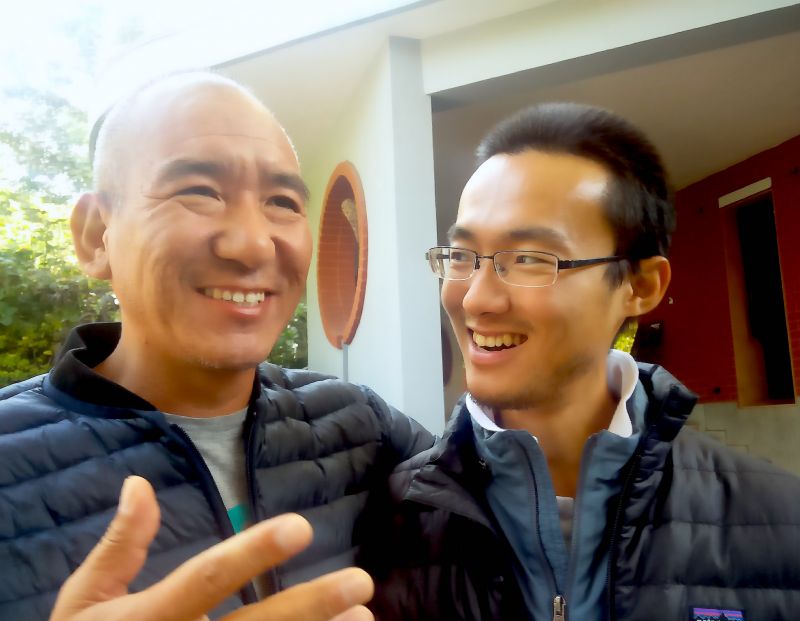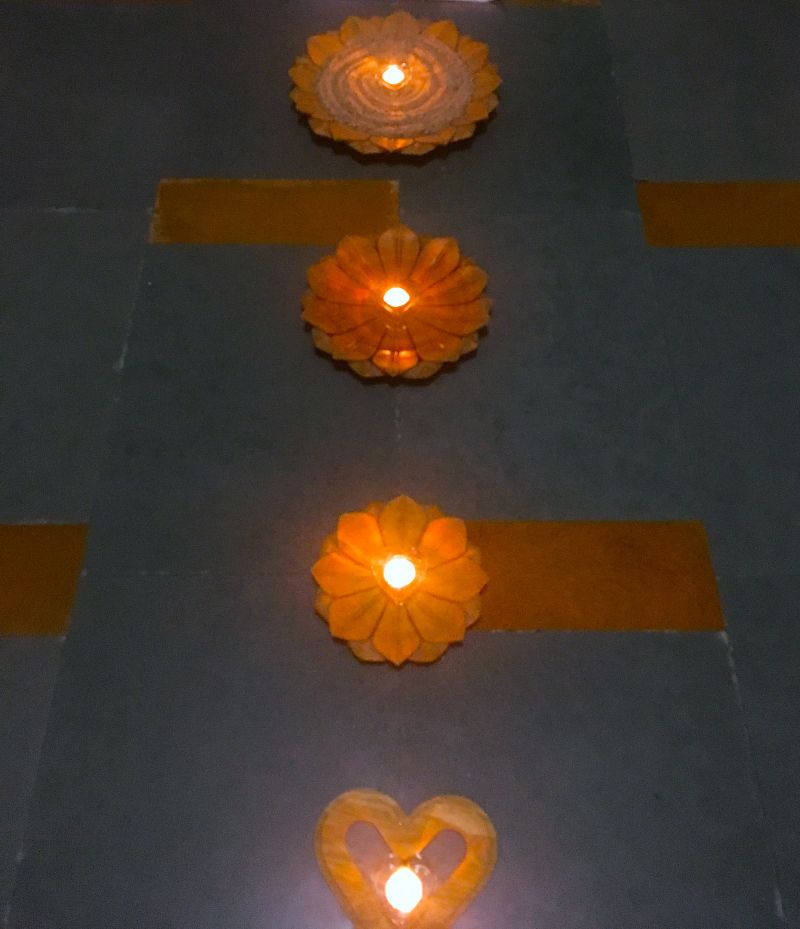A Hundred Thousand Times
[I met Lobsang in December. We were organizing Awakin Talks and when we met it didn't feel like we're meeting for the first time. He's a monk who left his monastery. So yeah, I thought that you know, he's a monk, he's traveled the world with H.H Dalai Lama and very close to him. So, I expected a very serious man who was going to say very profound things. He did say profound things, but it was very, very joyous and lighthearted. Lobsang comes from a place in India called Arunachal Pradesh from a small village, which is beyond Tawang. He takes three days to reach just the airport that can get him here. While going to his place, he has to cross a forest, which is dangerous to cross even in the daytime. He has a place which he calls Jhamtse Gatsal, which is "Garden of Love and Compassion," where he has 92 kids. He gives a lot of love to each one of them and he wants to create this place as a community center and a garden of compassion. Below is Lobsang's humorously playful and illuminatingly resounding share from the "Maitri Talks" evening of our Gandhi 3.0 Retreat. Originally posted Feb 18, 2018.]

Lobsang: Sachi introduced me as 'the monk who left monastery’. She is right. I have a different story. I had a very difficult childhood. In our tradition, it’s analyzed that there's two different kinds of people who go to monastery. One kind, who are very intelligent. They are really awakened ones who do amazing things. The other category in a Tibetan and Himalayan Society was often looked as a sort of an orphanage. That your family background is poor economically or socially. The ones who have a lot of challenge in their life, especially mental challenge. So I am from that latter category. :) Not from the upper side, to be honest with you. I'm not just being humble; I'm just sharing the facts.
In a western or modern term, I call it as almost like going into a mental hospital. You don't have hope. But in a very different environment, the 'mental hospital' where love, compassion and community are offered, it costs you everything you know. I was sent there when I was six or seven years old by my grandparents. I grew up there.
Luckily, I had amazing teachers. One thing they teach you is that there are two kinds of practice. In Tibetan, we say, “sausa dibjang,” which means “adding and losing”. My teachers told me that, "Lobsang, your practice is not adding. For you, it’s losing. We will help you start losing something.”
It’s pretty much like defecating. So much mental trash, so much mental disturbance, so much anger, so much hate, so many challenges. I almost broke every law we had in the monastery. :) That made me a little bit creative also.
Sometimes people say to me, "You grew up in a monastery at such a young age!”
At this time, maybe things are a little bit changed. When we were in a monastery, we weren't allowed to listen to music. We were not allowed to read any story. We were not allowed to do exercise. We were not allowed to watch any movies. We were not even allowed to read or listen to radio news or anything.
So people say, "Wow! That must have been a very difficult childhood.”
Actually, it was the opposite.
When you have over 200 laws of what not to do, then you really learn how to do everything in your teenage years. :) That part is a creative part of being. You are really busy. You don't need anything. You don't need phones to entertain you. You basically figure things out by breaking almost every law. :)
So losing something, was something that I wanted to share today. We say “losing” (or “subtracting”), or sometimes, “a purification”. You have so much that you have to lose, you have to really let it go. You have to lose that part, not the adding, you know.
I wasn’t even trained to become enlightened. I was not trained to really kind of lose something that I have so much of. In English we say, "You have so much baggage. Emotional baggage.”
There are monks like me who go to a monastery, not to add something to life, but they go there to lose something that they need to reduce.
One of the examples that we do in a 'Dibjang' is what we call a purification, or purifying. A letting go. Losing one hundred thousand frustrations, one hundred thousand offerings, of different water offerings, and so on.

My teacher asked me to make 100,000 butter lamps for him. Which is a practice. You make the same thing 100,000 times. And, sometimes, it's really boring. You do this, you keep doing this, keep doing this 100,000 times! And, oftentimes, you don't understand what you're doing. :) You know, you just make the butter lamp. And then, you pour butter. And then you light it. And then, when it's done burning, you remove the residue. Then, you dry and clean it. You keep doing this for months and months, and sometimes years.
If there's a chant, you practice, then you keep doing that. And eventually they explained to me that your process of losing — of subtracting or reducing — is just like the butter lamp. The butter is your own disturbing emotion. A 'wick' is the self-creation of you or ego. When we light a butter lamp, what you're basically doing is you're burning yourself — the diluted self of yourself — that 'I am bad, I am horrible things, I am really a mean person'. You are burning your projection to other people in the world. So when you keep burning like that, your own disturbing emotions are a fuel to that. This flame actually burns our own ego.
It's like a beautiful analogy that I need to lose my own disturbing emotion, my anger, my ignorance, my hatred, my aversion. And then my own self — you know, the projection of who I am as I've created it — is basically what I need to burn through a flame. Through a wisdom.
That was like 100,000 times. :)
And yet I could not understand what I was doing, why was doing it. It's exactly like saying, you kind of fake it 100,000 times until you do it right. So I was faking 100,000 times that I'm getting better, I'm losing and reducing myself, and I'm becoming a better human being.
This is something that I felt to share because of these little candles in front of me now. It reminded me as to why we have to do things 100,000 times. Making butter lamps and burning was something that I needed to lose for my life.
I have a sign on my door, "Be Aware: Change in Process” — not in “Progress”.
Sometimes I go up. Sometimes I go down. So it’s only a “change in process”. I've been trying that. I have to change, but, it’s a 'process'.
Thank you.
Posted by Sachi Maniar on May 15, 2018
SHARE YOUR REFLECTION
7 Past Reflections


On Feb 19, 2018 Shin Terayama wrote:

On Feb 19, 2018 Meghna Banker wrote:

On May 15, 2018 Gayathri Ramachandran wrote:





On Feb 19, 2018 Vasco Gaspar wrote:
Post Your Reply